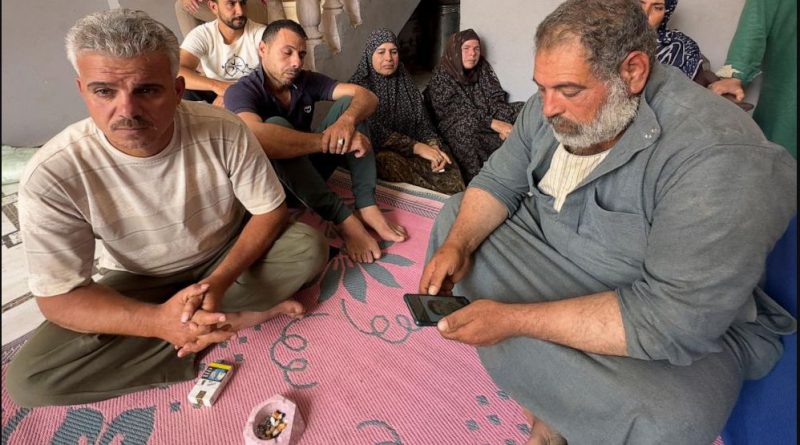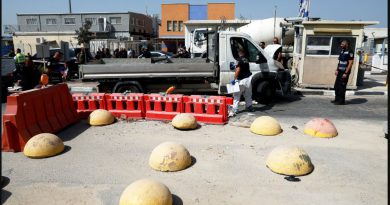Egyptian family awaits word on son as village mourns dozens feared drowned trying to reach Europe
Associated Press
Like many other families, Saleh’s relatives don’t know the fate of their son.
The last time Sabah Abd Rabu Hussein heard from her son, Yahia Saleh, he was planning to board a migrant vessel from conflict-ridden Libya to Europe. That was two weeks ago.
“I had begged him not to go,” the Egyptian housewife said Sunday, “but he became fed up with our difficult (living) conditions.”
The 18-year-old was on board an old fishing trawler that sailed from the town of Tobruk in eastern Libya on June 9. He was heading to Italy, like many other young men from his village in Egypt’s Nile Delta.
As many as 750 migrants, including women and children, were on the boat that capsized and sank off Greece in one of the deepest parts of the Mediterranean Sea.
Only 104 survived. As of Monday, the Greek authorities had retrieved 81 bodies, and the chances of finding anyone else alive have diminished. The shipwreck appears to be one of the worst tragedies in the Mediterranean in recent history, raising questions and outrage over how European authorities have dealt with the influx of migrants.
Like many other families, Saleh’s relatives don’t know the fate of their son. Born to a family of farmers, he was the second of four children and left home less than a month ago without telling them about his plans.
The family is from Ibrash, in the agricultural Nile Delta province of Sharqia, where water buffalos, cows and donkeys share dirt roads with cars, motorbikes and three-wheeled rickshaws known as tuk-tuks.
Many of the area’s young men and teenagers have made the perilous trip to Libya, hoping to cross the Mediterranean to Europe. Some of them managed to reach Italy, but many others were detained and returned, according to five villagers, all of whom spoke on condition of anonymity for fear of being targeted by authorities.
Egypt, the most populous Arab nation with 105 million people, has sealed off its maritime borders for migrant boats following a 2016 deadly shipwreck off the Mediterranean town of Rossetta. The government regularly tries to discourage young men from illegal migration, but the country’s economic crisis has motivated many to try to leave despite the dangers.
Following the shipwreck on June 14, the Greek authorities arrested nine Egyptian men and charged them with people smuggling and participating in a criminal enterprise.
Libya has become the dominant transit point for migrants from Africa and the Middle East trying to make it to Europe. The country plunged into chaos following a NATO-backed uprising that toppled and killed longtime autocrat Moammar Gadhafi in 2011.
Those hoping to make the journey to Europe travel thousands of kilometers (miles) on land to reach Libyan shores, where traffickers pack them in unseaworthy boats.
Dozens of Egyptians were on the trawler. They included as many as 35 from Saleh’s village, most of them minors or single men in their early 20s. Only six are known to have survived the shipwreck, according to relatives.
On Saturday, the Egyptian Embassy in Athens shared a list of 43 Egyptians, including minors, who it said had survived. The list included migrants from Cairo and other Nile Delta provinces.
“The village is wounded,” said one villager, Sameh el-Gamal. “It’s a catastrophe. Each family has a funeral.”
For over six months, Saleh’s parents tried to talk him out of his plans to make the perilous trip. But he had become increasingly determined as his family’s living conditions deteriorated. He helped his father cultivate their small farm, and sometimes worked as a day laborer, earning about $60 a month, his mother said.
“He wanted to help us,” Hussein said.
Saleh planned to follow in the steps of other villagers who traveled to Europe via Libya over the past few years and sent money back home, his father, Mohammed Saleh, said.
One evening in mid-May, he bid farewell to his mother without telling her where he was going. She thought he would spend his evening with friends.
“He kissed my forehead as if he knew that it would be the last time he would see me,” Hussein remembered.
A day later, the parents found out that he had traveled to Libya with his cousin and four other men. He had borrowed around $50 from a villager to pay for the trip. The five traveled first to the Mediterranean city of Alexandria and then to the coastal town of Salloum on the border with Libya. There, traffickers smuggled them across.
His father and other relatives frantically reached fellow Egyptians living in Libya, who connected them with traffickers working between Egypt and Libya.
“I begged them to get my son back,” he said, fighting tears. He said he offered to pay them up to 50,000 Egyptian pounds (over $1,600) to return him. They refused.
“They told me, ‘He has been warehoused, waiting to sail’ and asked me to pay the bill,” Saleh, the father, said.
Eventually, he gave in and paid the equivalent of more than $4,500, most of which he borrowed, for fear that if he didn’t, his son could face torture or death at the hands of the smugglers.
For the past week, Saleh’s family have been desperately hoping for word of their son or the others. They want to know whether he is among the survivors, the dead, or still missing.
“I want my son, I want him alive or dead,” his mother said, covering her face with her hands and sobbing.


